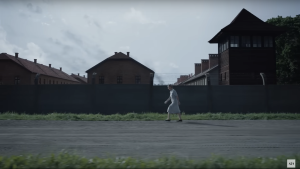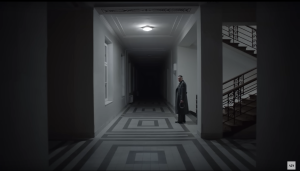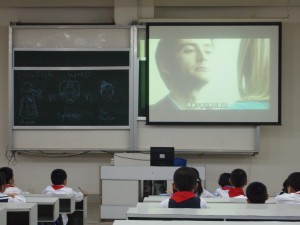Constant Screaming: A Review of The Zone of Interest
by Maya Herz | March 16, 2024

“Are you sleeping well?” asks the white-coated SS doctor.
“Yes,” replies Rudolf Höss.
Jonathan Glazer, the man behind Sexy Beast, a heist film about a retired English gangster with skin sunburned to the colour and texture of red crocodile leather; Birth, in which a ten-year-old (graphically) convinces Nicole Kidman that he is the reincarnation of her dead husband; and a banned Flake advertisement starring an equally red Denis Lavant as the Devil, has now turned his capable hands to an archetypally serious topic.
The events of 1941-45 have inspired plenty of good art, and plenty of heinous art. But very little of this art is actually about the Holocaust as such. Take Schindler’s List: it’s not about the Holocaust; it is about Oskar Schindler and various other characters and merely happens to be set during (as Leni Riefenstahl elegantly put it) Germany’s ‘blighted and momentous’ 1940s. The Zone of Interest, however, enters the brief catalogue of works which take the Holocaust as direct subject rather than setting. This is not a guarantee of quality – lots of good literature has used the latter – but often an indicator of it. It speaks about the unspeakable, and therefore must do so obliquely, from a distance.
The film has a faint narrative, centred around Höss, commandant of (spoiler alert) Auschwitz, who is dispatched from idyllic Poland to a new post in grim Oranienburg, to the understandable dismay of his wife Hedwig. This narrative is really an excuse to give us a tour of the house, like the visit of Hedwig’s mother early on. The Höss villa, which is meticulously and accurately reconstructed over the course of several years by Glazer and his team based on survivors’ testimonies, is spotless and rustically charming. A wall separates it from the camp (never visible, but audible in the form of constant screaming), a wall upon which Frau Höss is planting grapevines, which will, she hopes, eventually bear fruit and feed future generations of her copious, sporty, flaxen-haired offspring.
Miscellaneous good points: impeccable casting, especially Sandra Hüller as the brutal, perpetual-pregnancy-waddle Hedwig; excellent and disturbing touches of what I will term Nazi kitsch (Höss’ grotesquely excessive love of animals, the elaborate braids of the children, the fact that Höss always has his socks pulled all the way up); ominous electronic score by Mica Levi.
There are almost no close-ups. The shots are long (in range and duration), on grainy filmstock, which lends the whole movie the dispassionate quality of surveillance footage. We see the family go about their banal (sorry) lives: a picnic, a ride in the canoe – a birthday present for Rudolf! – breakfast, lunch, and dinner. The camera records everything with a sober eye: at one point Hedwig closes her bedroom door in order to try on a full-length fur coat – we guess where it comes from. She preens before the mirror. She finds a lipstick in one of the pockets, and later returns to the room try it on, before wiping it off her lips. She is alone, neither guilty nor especially gleeful, and the camera relays to us her unhurried movements. An atmosphere of crystallised horror prevails. We have to keep watching, keep listening.

Glazer has created a movie which is psychologically flawless (the scenes between husband and wife portray emotion with confident realism) and yet avoids any indulgence in cheap psychologising. This is not an inquiry into the mind of Rudolf Höss, however twisted. Nor is it a documentary, which would also entail a certain imposition of narrative. Instead, like other great post-Holocaust art, such as the poetry of Paul Celan, The Zone of Interest insists on a new and radical alliance of form and content.
It is impossible to make a film really about Auschwitz with the resources (cinematic or otherwise) of a culture that did not prevent Auschwitz. If movies are to have any meaning in relation to people’s actual lives, then genocide must alter them fundamentally – in their substance.
Riefenstahl, in a 1964 interview about Triumph of the Will (the film which she directed of the 1934 Nazi Party Congress in Nuremberg), claimed that “everything in it is true. And it contains no tendentious commentary at all. It is history.” This is patently false. It also demonstrates the opposition between her technique and Glazer’s. Triumph of the Will, since the Nuremberg rally was staged partially in order that it could be filmed, creates the illusion of a reality-content with an aesthetic form the beauty of which naturally accords precisely with the ideology which the film expresses. It is all tendentious commentary, pretending not to be. Of course, the clinical style of The Zone of Interest does not constitute an absence of commentary. But it does eschew the whole book of tricks which finds its most extreme, obscene expression in Riefenstahl’s propaganda; its apparent coldness and ugliness is the complete opposite of propaganda as such, of culture which oppresses the mind of those who see and hear it.
And although the film’s ‘true’ subject is the Holocaust itself, this does not mean that the literal sounds and images of which it is composed are irrelevant or allegorical. They are fundamental. They are crafted with an honesty and meticulousness, mirroring the monstrous fastidiousness of the Nazi administration: the endless record-books, kept even in the midst of indiscriminate death; the plans, schematics, business-like memoranda. Höss sends a message to his soldiers forbidding them to pluck more than a certain number of blossoms from the lilac bush at the entrance to the camp.
Glazer’s technique is not entertaining, or sentimental (again, not a quality inherently to be criticised – Malle’s Au revoir les enfants, for example, is good and about the blighted and momentous years and terribly sentimental) – but it is truthful. The whole idea of never showing the camp itself and instead having constant screaming in the background of the entire movie, although it does sound like a pretty naïve conceit, is a true, exact, and effective one.
The allure of the sentimental Holocaust film à la Schindler’s List is that it asserts love or humanity or whatever in the face of incomprehensible atrocity, which is great news for love and humanity. But it does not really depict the atrocity. It only gestures to it with certain pre-arranged signs. The achievement of this unsentimental Holocaust film is that it depicts, with single-minded attention, exactly and only what it sets out to depict.
Höss was compelled to write his own autobiography in 1947 before his execution at Auschwitz, beside the crematorium, by the Polish authority. In it, he mused: ‘Yet who is able to foresee the intricate course of a man’s destiny? What is right? And what is wrong?’. The Zone of Interest, in its supreme clarity, destroys this lack of attention, this failure of focus, this immense, heaving stupidity. Check it out if you get the chance. ∎

Words by Maya Herz.




